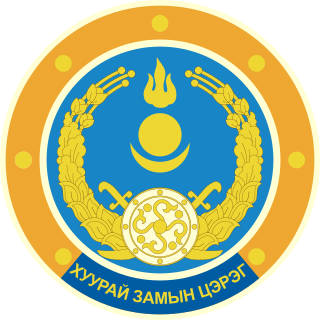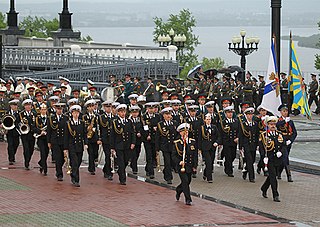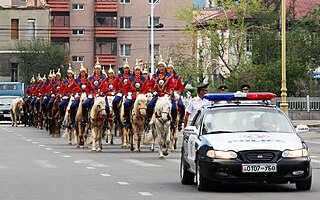
The Ground Force of Mongolia is the land force of the Mongolian Armed Forces, formed from parts of the former Mongolian People's Army in 1992. It was known as the "Mongolian General Purpose Force" until 2016.

Mongolian military Day is a public celebration day in Mongolia is celebrated on 18 March annually. Being the official holiday of the Mongolian Armed Forces, it is the equivalent of Defender of the Fatherland Day in Russia and/or the male version of International Women's Day.
The Military ranks of Mongolia are the military insignia used by the Mongolian Armed Forces and other military organisations such as Border defense troops, Internal troops, National emergency management agency, General executive agency of Court decision, General intelligence agency, and the State special security department.

Khaltmaagiin Battulga, also referred to as Battulga Khaltmaa, is a Mongolian politician and sambo wrestler who served as the 5th President of Mongolia from 2017 to 2021. He served as Member of the State Great Khural from 2004 to 2016 and Minister of Roads, Transportation, Construction and Urban Development from 2008 to 2012. Before his career in politics, Battulga was a sambo wrestling champion. He was the Democratic Party's candidate in the 2017 presidential election and was elected President with 50.6% in the run-off, the first-ever run-off election in modern Mongolian history. Mongolians are divided about his role in the 2019 Mongolian constitutional crisis. He was elected as a Member of the State Great Khural for the fourth time in the 2024 parliamentary election.

The Military Band Service of the Armed Forces of the Republic of Belarus is the central military band service of the Armed Forces of Belarus. The band was formed on 1 April 1950 as the Band of the Belorussian Military District. It was expanded into a service in the 1990s after the Independence of Belarus occurred. Its bands participate in military parades, military tattoos, and official ceremonies of Belarus. They perform domestically, regularly performing in the Central Officers House in Minsk, as well as other garrison clubs. The massed bands of the Minsk Garrison is an annual participant in the parades of the Minsk Garrison on Victors Avenue since 2004. The repertoire of the band includes more than 500 compositions of the most important classical music composers and contemporary ones. Bands have performed in festivals in Great Britain, Ireland, Germany, France, Poland, Sweden, and Russia. The band has also played in the Spasskaya Tower military tattoo in 2013, 2016, and 2017. The band is commanded by its Senior Director of Music/Chief Conductor, Lieutenant Colonel Igor Khlebus, since 2019. The artistic director of the band is Colonel Evgueny Dovzhik.

The Ministry of Defence of Mongolia is a ministry of the Government of Mongolia. According to the Law on the Defence of Mongolia, the Ministry is responsible for developing Defence Policy, coordinating its political, economic, social, legal and military implementation, and exercise civilian control over the Mongolian Armed Forces. The current Minister Gürsediin Saikhanbayar was appointed in July 2020.

Central Military Band of the Ministry of Defense of Russia, also known as the Red Army Band is a military band unit of the Russian Armed Forces. It is a branch of the Military Band Service of the Armed Forces of Russia. The current head of the band is Colonel Sergey Durygin.

State Flag Day is the main state holiday in Mongolia, being celebrated annually on July 10. State Flag Day is celebrated with a central government-sponsored events including a military parade and a flag raising ceremony on Sükhbaatar Square in the capital of Ulaanbaatar.
Sergey Nikolaevich Kostiuchenko is a Belarusian military conductor. He is the former Chief Director of the Military Band Service of the Armed Forces of the Republic of Belarus, holding this post from 2008-2019. At 11 in the band service was the second longest serving director of the bands after Alexander Fedorov who served for 14 years.

The Mongolian State Honor Guard is an honor guard unit of the Armed Forces of Mongolia. The Mongolian State Honor Guard was founded on 16 August 1955, as an honor guard unit of the People's Army of the Mongolian People's Republic.

Russian military bands fall under the jurisdiction of the Military Band Service of the Armed Forces of Russia, which is the official music service for the Russian Armed Forces, and led by the Senior Director of Music, a billet of an officer with the rank of a Colonel or a general officer. There are between 200 and 300 military bands in the Russian Armed Forces that span across the military as well as all uniformed services in the country. All bands, active or reserve, are composed of graduates from the military music training centers stationed anywhere in the country, as well as of civilian conservatories. While choirs may be attached to military bands, individual staff choirs do not exist in the Russian Armed Forces, since they have attached instrumental ensembles or orchestras. As of 2009, all military musicians are paid around 13,000 rubles ($169.65) for their service in the Armed Forces and other uniformed organizations.

The Band of the Central Army House of the General Staff of the Armed Forces of Kyrgyzstan commonly known as the Band of the General Staff, also formerly known as the Band of the Ministry of Defense is a military musical group of the Kyrgyz Army. It was officially founded on October 7, 1992, by the Order of the Chairman of the State Committee of the Kyrgyz Republic for Defense Affairs, as the successor to the band of the 8th Guards Panfilov Division. In connection with the reorganization of the Armed Forces in December 1995, the band was put under the direct command of the Central Army House of the Armed Forces General Staff.

The Military Music College of Mongolia is a military music institution in the Mongolian National Defense University. It is designed to prepare cadets to become professional musicians for art organizations in the Armed Forces of Mongolia, such as the Mongolian Military Song and Dance Academic Ensemble. It was founded in 1991 by the Ministry of Defense following the fall of communism in Mongolia.
The National Defense University (MNDU) is an accredited Mongolian military university located in Ulaanbaatar, Mongolia. Founded in 1921, it is the country's premier and oldest military educational institution. The NDU prepares officers and NCOs alike to have grounded leadership skills, physical and moral strength and a high military and civilian education.

The Mongolian Military Song and Dance Academic Ensemble is an official academic ensemble of the Mongolian Armed Forces. It is located on Sükhbaatar Street in the Mongolian capital of Ulaanbaatar. It is under the direct command of the Mongolian Defense Ministry.

The Chief of the General Staff of the Mongolian Armed Forces is the highest-ranking professional military leader in the Mongolian Armed Forces. The Chief of the General Staff carries out his duties under the governance of the Commander-in-Chief and serves as the principal advisor to him/her on military affairs. He/She is responsible for the implementation of operational orders and directives to maintain the combat readiness of the armed forces in peacetime. In wartime, the chief directs the military in accordance with the commander-in-chief.
The Mongolian Military Museum, also known as the Museum of the Mongolian Armed Forces, is a military museum located in Bayanzürkh District, Ulaanbaatar, Mongolia. It explains Mongolian military history dating back to the Mongol Empire. It is currently located across from an army barracks. The museum is part of the Ministry of Defense.

The 032 Separate Commandant's Battalion named after Colonel General Jamsrangijn Jondon, known simply as the 032 Military Unit is a military unit of the Armed Forces of Mongolia. The unit takes part in the peacetime protection of the capital, with its main task being of law enforcement and to continuously organize daily activities, military supplies and services.
The 084th Special Task Battalion, named after former Minister of Defense Lieutenant General Shagalyn Jadambaa and also known as the Parachute Special Forces Battalion is the tier one special force unit of the Armed Forces of Mongolia. It specializes in clandestine operation, counterterrorism, direct action, executive protection, hostage rescue, long-range penetration, and unconventional warfare as well as air assault operations. It serves to engage in capture or kill high-value targets, combat search and rescue, counterinsurgency, counterterrorism, irregular warfare, special operation behind enemy lines, and special reconnaissance. It also conducts hostage rescue and provides security for high-level visitors and facilities.

The General Staff of the Armed Forces of Mongolia is a permanent military body in Mongolia. According to the Law on the Armed forces, General Staff is the professional managing body and the headquarters for the Mongolian Armed Forces and operates independently from the Ministry of Defense, its parent body. It serves as the highest decision making body in the armed forces outside of the government controlled defense ministry and provides the armed forces with integrated military management as well as participates in the development of defense policy and the planning and organizing of the military. It also informs and consults with the National Security Council on defense matters. It is led by the Chief of the General Staff who is the professional head of the military, being the equivalent to the American Chairman of the Joint Chiefs of Staff and the Russian Chief of the General Staff. The current Chief of the General Staff is Lieutenant General Dovchinsuren Ganzorig. The headquarters of the General Staff is located in Ulaanbaatar.

















